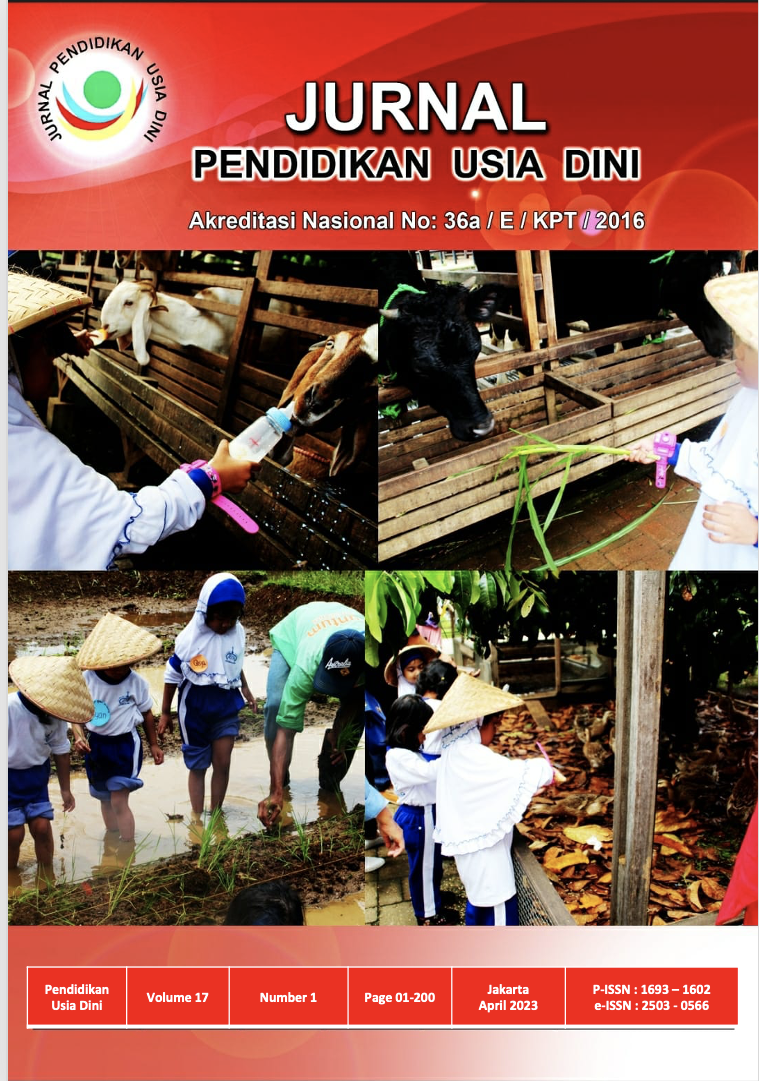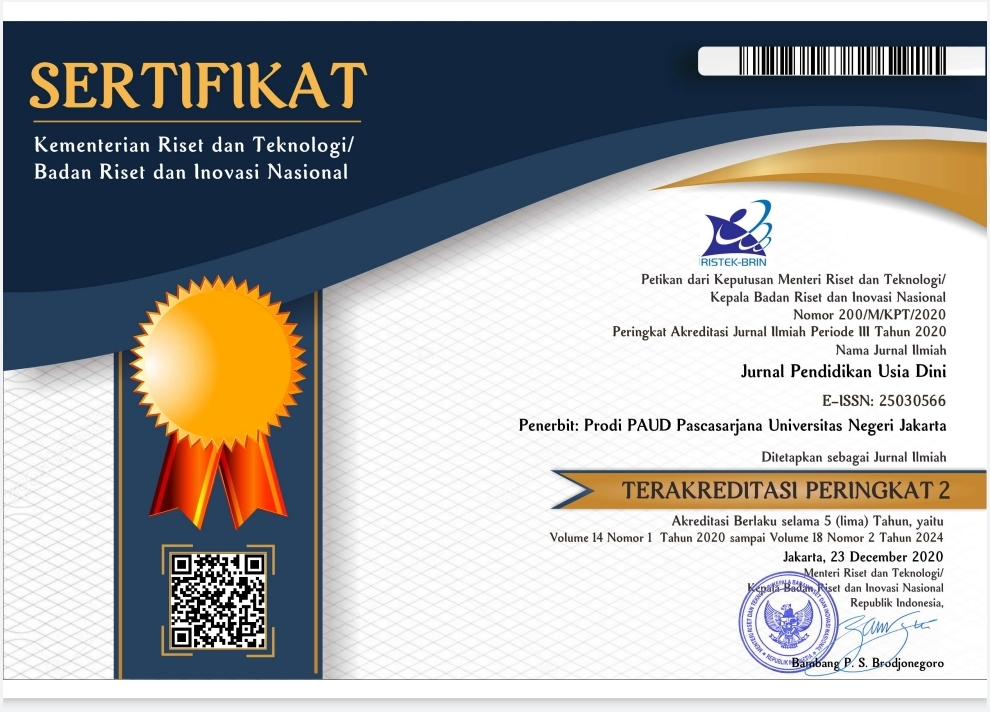Early Childhood Teacher Job Satisfaction in Terms of Technostress and Work-Family Conflict in Indonesia
DOI:
https://doi.org/10.21009/JPUD.171.09Abstract
Teachers have an important and primary role in the education system. The achievement of the teacher's role in education will have an impact on job satisfaction. This study aims to analyze the job satisfaction of Early Childhood Education teachers in terms of variables of technostress and work-family conflicts among teachers who are married. This study was designed with a correlational quantitative design. Data collection is done online with the assistance of Google forms-distributed throughout Indonesia. One hundred and fifty-seven teacher respondents who fit the criteria became the research sample. The data analysis technique uses hierarchical regression. The results of the analysis stated that there was a relationship between technostress and job satisfaction. The findings show that two of the five aspects of technostress that techno-overload and techno-insecurity have a negative correlation with job satisfaction, while techno-uncertainty has a positive correlation. In addition, two aspects of technostress namely techno-invasion and techno-complexity do not correlate with job satisfaction. next to the relationship between work-family conflict with job satisfaction. The findings show that one of the two aspects of work-family conflict is strain negatively correlated with job satisfaction while time and behavior do not correlate with job satisfaction. Based on the results of this study it can be concluded that early childhood teachers are more affected by their job satisfaction technostress/techno-overload compared to work-family conflict.
Keywords: early childhood teacher, job satisfaction, technostress, work-family conflict
References:
A Suh, JL (2017). Understanding teleworkers' technostress and its influence on job satisfaction. Internet Research, 27(1), 140–159. https://doi.org/10.1108/IntR-06-2015-0181 1.
Dwi Putranti, A., & Achmad Kurniady, D. (2013). The Contribution of Kindergarten Principals' Transformational Leadership and Teacher Job Satisfaction to Organizational Citizenship Behavior (Ocb) of Kindergarten Teachers throughout Kudus Regency. Journal of Education Administration, 1, 1–11.
Effiyanti, T., & Sagala, GH (2016). Technostress in Teachers: Confirmation of the Stressor and Its Antecedents. XIX National Symposium on Accounting, 1–18.
Ernst Kossek, E., & Ozeki, C. (1998). Work–family conflict, policies, and the job–life satisfaction relationship: A review and directions for organizational behavior–human resources research. Journal of Applied Psychology, 2(83), 139–149. https://doi.org/https://doi.org/10.1037/0021-9010.83.2.139
Frone, M., Russell, M., & Cooper, C. (1992). Prevalence of work-family conflict: Are work and family boundaries asymmetrically permeable? Journal of Organizational Behavior, 13(7), 723-729.
Ghufron, MN (2016). Early Childhood Teacher Job Satisfaction in Terms of Class Climate and Teaching Efficacy. Ghufron. NM,. 2016, 4(2), 254–270.
Greenhaus, JH, & Beutell, NJ (1985). Sources of Conflict between Work and Family Roles. The Academy of Management Review, 10(1), 76. https://doi.org/https://doi.org/10.2307/258214
Gregson, T. (1987). Factor Analysis of a Multiple-choice Format For Job Satisfaction. Sage Journals, 61(3), 747–750. https://doi.org/https://doi.org/10.2466/pr0.1987.61.3.747
Hardiyanti, WE, & Alwi, NM (2022). Analysis of the Digital Literacy Capabilities of ECE Teachers during the COVID-19 Pandemic. Journal of Obsession : Journal of Early Childhood Education, 6(4), 3759–3770. https://doi.org/10.31004/obsession.v6i4.1657
Herzberg, F. (1965). Job attitudes in the Soviet Union. Personnel Psychology.
Hong, X., Liu, Q., & Zhang, M. (2021). Dual Stressors and Female Pre-school Teachers' Job Satisfaction During the COVID-19: The Mediation of Work-Family Conflict. Frontiers in Psychology, 12(June). https://doi.org/10.3389/fpsyg.2021.691498
Jena, R. (2015). Technostress in ICT enabled collaborative learning environment: An empirical study among Indian academicians. Computers in Human Behavior, 51.
Jena, RK (2015). Impact of Technostress on Job Satisfaction: An Empirical Study among Indian Academicians. The International Technology Management Review, 5(3), 117. https://doi.org/10.2991/itmr.2015.5.3.1
Jiang, Y., Li, P., Wang, J., & Li, H. (2019). Relationships Between Kindergarten Teachers' Empowerment, Job Satisfaction, and Organizational Climate: A Chinese Model. Journal of Research in Childhood Education, 33(2), 257–270. https://doi.org/10.1080/02568543.2019.1577773
Kahn, RL, Wolfe, DM, Quinn, R., Snoek, JD, & R., & A, R. (1964). Organizational stress. New York: Wiley.
Kim, S., & Lee, J. (2021). The mediating effects of ego resilience on the relationship between professionalism perception and technostress of early childhood teachers. International Journal of Learning, Teaching and Educational Research, 20(4), 245–264. https://doi.org/10.26803/IJLTER.20.4.13
Kreitner, R. and AK (200 CE). Organizational behavior. Jakarta: Salemba Empat.
Kumar, K & Bhatia, L. (2011). Teachers and their Attitude Towards Teaching. Asia Pacific Journal of Research in Business Management, 2(9).
Laksmi, NAP, & Hadi, C. (2012). The relationship between Dual Role Conflict (Work Family Conflict) and Job Satisfaction in Production Employees at PT.X. Journal of Industrial and Organizational Psychology, 1(02), 66–72.
Lazarus, RS & Folkman, S. (1984). Stress, appraisal, and coping. New York : McGraw-Hill, Inc.
Liu, XS, & Ramsey, J. (2008). Teachers' job satisfaction: Analyzes of the Teacher Follow-up Survey in the United States for 2000–2001. Teaching and Teacher Education, 24(5), 1173–1184. https://doi.org/10.1016/J.TATE.2006.11.010
Mukhlishon, G. (2016). The relationship between Technostress and Job Satisfaction and Organizational Commitment to Mojokerto Hospital Employees. Thesis, University of Surabaya.
Netemeyer, RG, Boles, JS, McMurrian, R. (1996). Development and validation of work-family conflict and family-work conflict scales. Journal of Applied Psychology, 81, 400–410. https://doi.org/doi:10.1037/0021-9010.81.4.400
Nisak, IA (2020). The effect of technostress on job satisfaction with work-family conflict and work-family conflict as intervening variables in PDAM Kota…. http://etheses.uin-malang.ac.id/19081/
Noor, NM, & Zainuddin, M. (2011). Emotional labor and burnout among female teachers: Work-family conflict as mediator. Asian Journal of Social Psychology, 14(4), 283–293. https://doi.org/10.1111/j.1467-839X.2011.01349.x
PC Smith, LM Kendall, and CLH (1969). The measurement of satisfaction in work and retirement. Rand McNally. Chicago.
Park, HJ, & Cho, JS (2016). The influence of information security technostress on the job satisfaction of employees. Journal of Business and Retail Management Research, 11(1), 66–75.
Pusdatin Kemendikbud Indonesia. (2021). Early Childhood Education Statistics (ECE) 2020/2021. Ministry of Education and Culture, 1.
Raharjo, NP, & Winarko, B. (2021). Analysis of the Digital Literacy Level of the City of Surabaya's Millennial Generation in Overcoming the Spread of Hoaxes. Komunika Journal: Journal of Communication, Media and Informatics, 10(1), 33. https://doi.org/10.31504/komunika.v10i1.3795
Ramakrishna Ayyagari, VG and RP (2011). Technostress: Technological Antecedents and Implicat. Management Information Systems Research Center, University of Minnesota Stable, 35(4), 831–858. https://www.jstor.org/stable/41409963
Roesadi, NFA (2022). The Impact of Technostress on Job Satisfaction During the Covid-19 Pandemic (Study of Educators in Gunungkidul Regency) [Yogyakarta College of Economics]. http://repository.stieykpn.ac.id/id/eprint/2015
Setyawati, R., Ekadewi, D., & Hapsari, MI (2021). The Role of Digital Literacy for Early Childhood Education Teachers to Implement Online Learning Activities During the Covid 19 Pandemic the Role of Digital Literacy for Early Childhood Education Teachers to Implement Online Learning Activities During the Covid. 360–365.
Sewell, G and Taskin, L. (2015). Out of sight, out of mind in a new world of work? Autonomy, control, and spatiotemporal scaling in telework,. Organization Studies, 36(11), 1507-1529.
Shabir U, M. (2015). Teacher's Position as Educator. Auladun, 2(2), 221–232.
Sunata, AAKSAIM (2014). (Study at Triatma Jaya Tourism Vocational School Badung, Tabanan and Buleleng). Journal of Management & Accounting STIE Triatma Mulya (, 20(2), 160–177.
Susanto, R. (2020). The Contribution of the Fundamental Factors of Job Satisfaction: The Foundation for the Professional Development of Educators. Scientific Journal of Education and Learning, 4(1), 2. https://ejournal.undiksha.ac.id/index.php/JIPP/article/view/25665/15441
Tarafdar, M., Tu, Q., Ragu-Nathan, BS, & Ragu-Nathan, TS (2007). The Impact of Technostress on Role Stress and Productivity. Journal of Management Information Systems, 24(1), 301–328. https://doi.org/10.2753/MIS0742-1222240109
Tarafdar, M., Tu, Q., Ragu-Nathan, TS, & Ragu-Nathan, BS (2011). Crossing to the dark side: Examining creators, outcomes, and inhibitors of technostress. Communications of the ACM, 54(9), 113–120. https://doi.org/10.1145/1995376.1995403
Widati, MA (2016). Effect of Multiple Role Conflict and Job Stress on Job Satisfaction (Study on Female Teachers at SLB Sri Mujinab Pekanbaru). Thesis, Yogyakarta Muhammadiyah University.
Worchek, S., & Shebilske, W. (1989). Psychology: Principles and Applications. New Jersey: Prentice Hall.
Yin, P., Ou, CXJ, Davison, RM, & Wu, J. (2018). Coping with mobile technology overload in the workplace. Internet Research, 28(5), 1189–1212. https://doi.org/10.1108/IntR-01-2017-0016
Downloads
Published
How to Cite
Issue
Section
License
JURNAL PENDIDIKAN USIA DINI work is licensed under a Creative Commons Attribution 4.0 International License. (http://creativecommons.org/licenses/by/4.0/)





